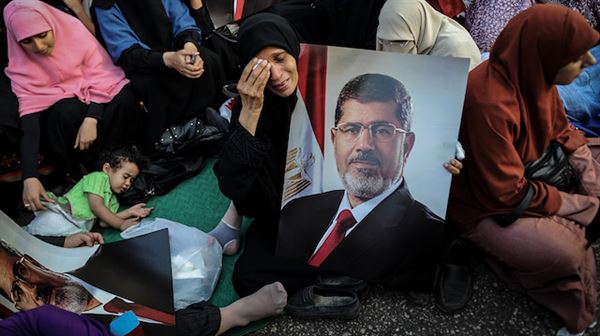A new report encouraged the UN to launch an independent investigation into the death of Mohamed Morsi, Egypt’s first democratically elected pres
A new report encouraged the UN to launch an independent investigation into the death of Mohamed Morsi, Egypt’s first democratically elected president, who was ousted in a 2013 military coup and died this June in the middle of a trial.
The report, published Wednesday and compiled by Guernica 37 International Justice Chambers at the request of Morsi’s family and the Egyptian Revolutionary Council, “looked into the circumstances surrounding the former President’s arrest, trial and subsequent death in custody.”
It pushes for a UN-led independent inquiry into Morsi’s death that “has been further bolstered, on 9 November 2019, by the UN Special Rapporteur on Extrajudicial, or Arbitrary Summary Execution and the UN Working Group on Arbitrary Detention calling for an effective independent and impartial investigation into the unlawful death of Dr. Morsi and of all other prisoners who had died in custody since 2012.”
Toby Cadman, a co-founder and head of Guernica 37, said Agnes Callamard, the UN special rapporteur on extra-judicial executions, has been forwarded a copy of the report and he will meet her within the next two weeks to discuss all the steps the UN can take.
– ‘Lack of proper medical care amounts to torture’
Speaking to Anadolu Agency at the report launch, Cadman said Callamard “stated very clearly that … there seems to be elements of Dr. Morsi’s death that point to state involvement and if there is state involvement, if it is a state-sanctioned murder, of course there has to be a criminal investigation.”
Cadman decried the conditions and circumstances Morsi was held in, saying a number of pre-existing medical conditions had already made Morsi slip into a diabetic coma even when “we had been asked by the Egyptian Revolutionary Council two years ago to bring this to the attention to the UN.”
“He was losing sight in one eye, and … his life was in danger,” he said.
Cadman said Egyptian authorities took no steps to remedy this and even refused an independent medical exam by an impartial physician.
If authorities take no action when a person’s health condition worsens when incarcerated, then those “authorities are responsible for death,” he said. “If you withhold necessary treatment from somebody that requires that medical treatment, under international law, that constitutes torture.”
Morsi was “not only killed by the Egyptian state, but what happened to him was torture,” Cadman added.
Cadman also said he found very hard to believe that the death this September of Morsi’s son, Abdullah, was the result of a heart attack, as claimed by the Egyptian state.
Cadman said he spoke with the younger Morsi during the two weeks leading to his death and he never complained about any health issues but said he feared for his own safety because he had accused Egypt’s Interior Ministry for his father’s death.
– Former president slept on concrete floor
Describing Morsi’s conditions while in prison, Maha Azzam, head of the Egyptian Revolutionary Council, said the former president was denied all rights under international law and the UN charter.
Azzam told Anadolu Agency that Morsi was put under “psychological pressure” and “torture” according to international conventions.
“He was held in solitary confinement and denied basic rights such as visits from his family. He was denied most importantly medication for his diabetes. He slept on a concrete floor without any bedding or blankets,” she said
He was subjected to “systematic torture” at the hands of the Egyptian regime’s security forces, Azzam added.
“We urge the UN Secretary-General [Antonio Guterres] and Ms. Callamard to take very seriously the death of an elected president through fair and free elections,” Azzam said.
“They are ignoring this fact and not pursuing it fully in terms of an independent investigation and sending a message to General [Abdel Fattah] Sisi and to the Egyptian regime that they can [have] actual impunity as regards the entire Egyptian people of 100 million and particularly towards to over 60,000 political prisoners today in Egypt’s prisons; political prisoners who … are now suffering in prisons a slow death.
“We know the names of these people; many of them are also women who are dying because of medical negligence and because of the very severe subhuman conditions.”
– First step for investigation
Anas Altikriti, head of the Cordoba Foundation, a U.K.-based group working to bridge understanding between the Muslim World and the West, called the new report “the first step” towards an international investigation into the circumstances of Morsi’s death.
Also speaking to Anadolu Agency, Altikriti said “what’s happened was a calamity on every front imaginable.”
“For years, a democratically elected president languished in prison under the authority of a dictatorship of a coup regime, of a military … non-democratic regime,” he said.
“His human rights were abused on a daily basis and by all accounts he was effectively killed,” he added.
Altikriti underlined he hoped the report would “open the floodgates” of a series of investigations not only into Morsi’s death but also into the circumstances of tens of thousands of others still kept in Egypt’s prisons.
“The UN remains a very important instrument in at least mounting the pressure upon fragile, frail, and often pathetic regimes such as the one we have in Cairo. And the most important thing is that the world must attest to the fact that crimes like these never go unaccounted for.”
Morsi, a leading member of Egypt’s Muslim Brotherhood, won Egypt’s first free presidential election in 2012.
After only a year in office, he was ousted and imprisoned in a military coup led by then-Defense Minister and current President Abdel-Fattah al-Sisi.
At the time of his death in June, Morsi faced a host of legal charges, which he, along with numerous human rights groups and independent observers, said were politically motivated.
